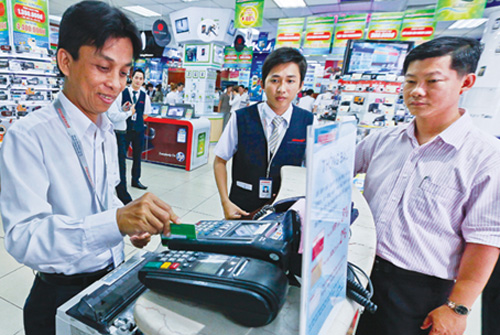Despite low demand, big guys still try to expand home appliance retail chains
Retailers still can see big opportunities in the Vietnamese home appliance market after a hot development period. Therefore, they still move ahead with the plans to expand retail chains, even though the market is gloomy at this moment.
Ten years after jumping into the home appliance retail market, Nguyen Kim only got four supermarkets. However, in 2011 alone, the retailer plans to open some 20 supermarkets nationwide.

It plans to open five more home appliance centers in some more days, while the other centers would be opened in the last months of the year.
By the end of 2010, The Gioi Di Dong, the leading digital product distribution chain had had 100 shops nationwide, while the number would rise to 210 by the end of 2011. To date, 190 shops of The Gioi Di Dong have been put into operation.
Dienmay.com, a subsidiary of The Gioi Di Dong, joined the market in late 2010 when it opened the first supermarket. Meanwhile, in 2011 alone, it opens 10 more supermarkets. When asked about the business plan for 2012, Dinh Anh Huan, Director of Dienmay.com, said that the chain would have 50 more supermarkets.
In the last two months of 2011 alone, Vien Thong A opened 10 retail points, raising its total number of retail points to 80. According to Bui Van Hoa, Deputy Director of Vien Thong A, in 2012, the distributor will have at least 50 retail points.
In early November 2011, EBest opened its first supermarket in HCM City, the first one available on the southern market. The move has been described as a venturous move, because many big guys, who started their business in the north and wanted to march to the south, all tasted defeat when conquering the southern market. Northern retailers are believed to be less powerful than the big guys in the south such as Nguyen Kim, Thien Hoa and Cho Lon.
Betting in the future
In order to open a home appliance shopping mall, retailers would need minimum retail premises of 1000 square meters, and they need to pay at least 10-15 billion dong for the deposit for the retail premises leasing, construction and importing goods.
As such, in order to open 20 supermarkets, Nguyen Kim would need to have at least 200 billion dong. Meanwhile, Dienmay.com would need to have at least 500 billion dong to fulfill its plan to open 50 more shops.
Huan, when asked about the investment capital, said that in general investors can use the capital from the goods sale and from the profits gained from other shops of the chains. However, it is clear that the current sky high lending interest rates and the policy on tightening the monetary policies are the big challenges for any investors who want to expand their networks.
However, retailers still have been determined to expand their business, because they well understand that in the difficult period, the expenses for expanding networks would be lower, because they can lease retail premises at lower rents, pay less for the labor force and for other expenses. Meanwhile, they can demand preferences from manufacturers and suppliers.
According to retailers, in 2011, the sales of many groups of products increase considerably but profits decrease: “They invest in the future. New retailers would have to incur losses for 3-4 years but that period would be much shorter for bigger retailers”, said Le Hong Xuan, Director of Tara, one of home appliance distributors.
According to GfK, a market survey firm, the home appliance market in 2011 witnesses the 4-38 percent growth rate in general. Only some groups of products see the decrease in sale. Refrigerator, digital camera, TV tube…, for example, saw the sales down by 5 – 40 percent.
GfK has predicted that the high growth rate would continue in 2012, for some kinds of products. It is estimated that 20 million mobile phones would be sold, an increase of 15 percent in comparison with 2011. Meanwhile, 1.2 million laptops would be consumed, an increase of 17 percent. The figures would be two million products and 35 percent for LCD and LED TV. Audio and video products for household use such as refrigerator and washing machine would see a lower growth rate of 8 – 12 percent.
Vietnamnet/ Source: SGTT


